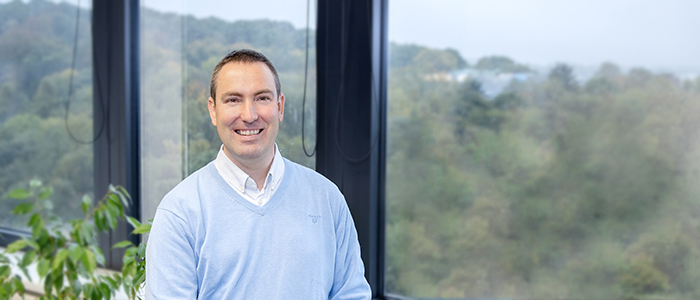
Professor Dr. Stefan F. Kirsch
Organic Chemistry
Functions
Vice-President for Research and Digital
Research
The Kirsch group focuses currently on three topics:
- Nitrogen-rich small molecules:
We study the synthesis and reactivity of compounds that have an unusually high nitrogen content, usually in the form of azides. - Diversity in small molecule synthesis:
The goal is to develop sustainable strategies for medicinal chemistry. To this end, methods will be developed to transform readily available starting materials into libraries of active ingredients to increase the structural diversity and complexity of available compounds. - Targeted synthesis of complex organic molecules with promising biological properties:
We are pursuing two strategies for the total synthesis of complex organic compounds.- Development of new domino reactions for the synthesis of terpenoids and steroids to minimize the number of necessary synthesis steps
- Development of a general strategy for the rapid synthesis of polyketide compounds
Publications
Rubazonic Acids and Their Synthesis,
M. L. Tong, L. T. Leusch, K. Holzschneider, S. F. Kirsch
J. Org. Chem. 2020, 85, 6008–6016
A Synthetic Route Toward Tetrazoles: The Thermolysis of Geminal Diazides,
K. Holzschneider, M. L. Tong, F. Mohr, S. F. Kirsch
Chem. Eur. J. 2019, 25, 11725–11733.
Enhanced site-selectivity in acylation reactions with substrate-optimized catalysts on solid supports,
M. L. Tong, F. Huber, E. S. Taghuo Kaptouom, T. Cellnik, S. F. Kirsch
Chem. Commun. 2017, 53, 3086–3089.
The Synthesis of α-Azidoesters and Geminal Triazides,
P. Klahn, H. Erhardt, A. Kotthaus, S. F. Kirsch
Angew. Chem. Int. Ed. 2014, 53, 7913–7917.
Total Synthesis of Polyrhacitides A and B by Use of an Iterative Strategy for the Stereoselective Synthesis of 1,3-Polyol Arrays,
H. Menz, S. F. Kirsch
Org. Lett. 2009, 11, 5634−5637
